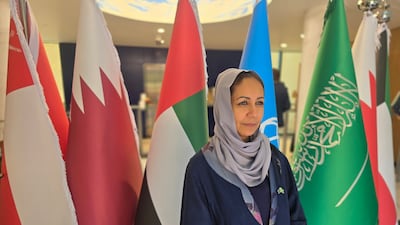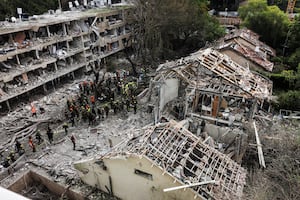Foreign direct investment in the Gulf could slow in the second half of this year as the war between Iran and Israel dents investor sentiment, in a similar impact of global uncertainty, the World Bank's GCC countries director said.
Investors will probably adopt a wait-and-see approach as the conflict that started with Israel's attacks on Iran's nuclear sites on June 12 worsens, Safaa El-Kogali told The National in Riyadh.
“Even if they've started [investing beforehand], they [foreign investors] might hold off until they see things settling down a bit,” she said on the sidelines of a World Bank seminar on Sunday.
De-escalation does not seem likely after President Donald Trump ordered the first-ever direct US military attack on Iranian soil earlier that day. The US attacked three Iran nuclear facilities with six bunker-buster bombs and launched Tomahawk missiles.
GCC countries had varied in their ability to attract FDI in 2024.
The UAE received Dh167 billion ($45.5 billion) in foreign direct investment last year, Sheikh Mohammed bin Rashid, Vice President and Ruler of Dubai, said in a post on X on Thursday. This represented a 48 per cent increase, he added.
The UAE accounted for 37 per cent of the total foreign investment flows in the region, he said.
Saudi Arabia's net FDI inflows in 2024 decreased as a share of GDP, amounting to 1.1 per cent compared to 2.1 per cent in 2023, according to a recent report by the World Bank.
Bahrain, Kuwait, and Qatar saw FDI fall by 7.3 per cent, 2.3 per cent and 0.5 per cent of GDP respectively from 2023 to 2024, it added.
Oman saw FDI increase by 2.4 per cent of GDP. This was due to “prudent fiscal management and diversification efforts” the report said.
What is the impact?
No one can accurately measure the impact of the escalation on the regional economies, but peace is necessary for economic security and the implications will be broad, Ms El-Kogali said.
“Increasing costs of commodities, of shipments – this will impact a number of industries that import raw material”, she said. The conflict will add to inflation, which will affect investors and consumers alike, she added.
“Whenever there is uncertainty … in any region, tourists usually decide not to go,” she said.
Travel and tourism made up about 11.4 per cent of the region's gross domestic product in 2024, according to the latest data from the Statistical Centre for the Co-operation Council for the Arab Countries of the Gulf.
Oil prices, which have surged since the beginning of the war, will also have an impact on the fiscal balance of Gulf countries that still rely heavily on oil as their primary source of revenue and exports, she said.
Brent and WTI surged by as much as 13 per cent in the first few hours of trading after Israel began its military campaign against Tehran.
Oil prices posted a third weekly gain in a row despite falling on Friday as the war sparked supply fears.
On Friday, Brent, the benchmark for two thirds of the world's oil, fell 2.33 per cent to settle at $77.01 a barrel. West Texas Intermediate, the gauge that tracks US crude, closed 0.28 per cent lower at $74.93 a barrel.
Who will feel it more?
Gulf countries that have diversified away from oil, such as the UAE, are more likely to resist hits caused by global economic uncertainty, Ms El-Kogali said.
This was a key message of the World Bank report, Smart Spending, Stronger Outcomes: Fiscal Policy for a Thriving GCC, released last week, that measured the growth of Gulf economies until June 1.
“I think this report is really timely, because it focuses on what the GCC countries have been doing, and what impact, or the effect, those policies that have been put in place [have had],” said Ms El-Kogali.
“The UAE has started the diversification agenda a while back and currently, with 74 per cent of GDP being from the non-oil sector, puts them in a stronger position.
“The more you diversify, the more you have different opportunities to deal with crises that come your way. When you put all your eggs in one bag, and something happens to that bag, then you're in greater trouble.”
Proper investment
Ms El-Kogali said that higher oil prices can benefit Gulf countries, depending on how revenue is spent in the non-oil sector.
“We think that as the non-oil sector continues to be strong and growing, with the easing off of the oil production cuts, that the countries of the GCC have good gross prospects in the short and medium term,” she said.
“We really expect growth to reach 4.5 per cent by 2026 driven by the oil and the non-oil.” It takes time to see the returns of investments she added.
This growth is particularly important during period of geoeconomic uncertainty.
However, “there may be the risk of spillovers” of the war which will impact the growth trajectory of Gulf nations, she said.
Gulf countries have been prudent in the past during crises and “we saw that implementing fiscal spending during downturns had a positive impact”, she said.
There is room to do more to further streamline spending and the Gulf countries must prioritise investments that have high returns, and can create jobs during difficult times, that will then sustain growth through economic cycles, she added.
What can victims do?
Always use only regulated platforms
Stop all transactions and communication on suspicion
Save all evidence (screenshots, chat logs, transaction IDs)
Report to local authorities
Warn others to prevent further harm
Courtesy: Crystal Intelligence
UAE currency: the story behind the money in your pockets
The Vile
Starring: Bdoor Mohammad, Jasem Alkharraz, Iman Tarik, Sarah Taibah
Director: Majid Al Ansari
Rating: 4/5
The smuggler
Eldarir had arrived at JFK in January 2020 with three suitcases, containing goods he valued at $300, when he was directed to a search area.
Officers found 41 gold artefacts among the bags, including amulets from a funerary set which prepared the deceased for the afterlife.
Also found was a cartouche of a Ptolemaic king on a relief that was originally part of a royal building or temple.
The largest single group of items found in Eldarir’s cases were 400 shabtis, or figurines.
Khouli conviction
Khouli smuggled items into the US by making false declarations to customs about the country of origin and value of the items.
According to Immigration and Customs Enforcement, he provided “false provenances which stated that [two] Egyptian antiquities were part of a collection assembled by Khouli's father in Israel in the 1960s” when in fact “Khouli acquired the Egyptian antiquities from other dealers”.
He was sentenced to one year of probation, six months of home confinement and 200 hours of community service in 2012 after admitting buying and smuggling Egyptian antiquities, including coffins, funerary boats and limestone figures.
For sale
A number of other items said to come from the collection of Ezeldeen Taha Eldarir are currently or recently for sale.
Their provenance is described in near identical terms as the British Museum shabti: bought from Salahaddin Sirmali, "authenticated and appraised" by Hossen Rashed, then imported to the US in 1948.
- An Egyptian Mummy mask dating from 700BC-30BC, is on offer for £11,807 ($15,275) online by a seller in Mexico
- A coffin lid dating back to 664BC-332BC was offered for sale by a Colorado-based art dealer, with a starting price of $65,000
- A shabti that was on sale through a Chicago-based coin dealer, dating from 1567BC-1085BC, is up for $1,950
THE BIO
Born: Mukalla, Yemen, 1979
Education: UAE University, Al Ain
Family: Married with two daughters: Asayel, 7, and Sara, 6
Favourite piece of music: Horse Dance by Naseer Shamma
Favourite book: Science and geology
Favourite place to travel to: Washington DC
Best advice you’ve ever been given: If you have a dream, you have to believe it, then you will see it.
Manchester City transfers:
OUTS
Pablo Zabaleta, Bacary Sagna, Gael Clichy, Willy Caballero and Jesus Navas (all released)
INS
Ederson (Benfica) £34.7m, Bernardo Silva (Monaco) £43m
ON THEIR WAY OUT?
Joe Hart, Eliaquim Mangala, Samir Nasri, Wilfried Bony, Fabian Delph, Nolito and Kelechi Iheanacho
ON THEIR WAY IN?
Dani Alves (Juventus), Alexis Sanchez (Arsenal)
How it works
Booklava works on a subscription model. On signing up you receive a free book as part of a 30-day-trial period, after which you pay US$9.99 (Dh36.70) per month to gain access to a library of books and discounts of up to 30 per cent on selected titles. You can cancel your subscription at any time. For more details go to www.booklava.com
Soldier F
“I was in complete disgust at the fact that only one person was to be charged for Bloody Sunday.
“Somebody later said to me, 'you just watch - they'll drop the charge against him'. And sure enough, the charges against Soldier F would go on to be dropped.
“It's pretty hard to think that 50 years on, the State is still covering up for what happened on Bloody Sunday.”
Jimmy Duddy, nephew of John Johnson
The%20specs
%3Cp%3E%3Cstrong%3EEngine%3A%20%3C%2Fstrong%3E2.3-litre%204cyl%20turbo%0D%3Cbr%3E%3Cstrong%3EPower%3A%20%3C%2Fstrong%3E299hp%20at%205%2C500rpm%0D%3Cbr%3E%3Cstrong%3ETorque%3A%20%3C%2Fstrong%3E420Nm%20at%202%2C750rpm%0D%3Cbr%3E%3Cstrong%3ETransmission%3A%20%3C%2Fstrong%3E10-speed%20auto%0D%3Cbr%3E%3Cstrong%3EFuel%20consumption%3A%20%3C%2Fstrong%3E12.4L%2F100km%0D%3Cbr%3E%3Cstrong%3EOn%20sale%3A%20%3C%2Fstrong%3ENow%0D%3Cbr%3E%3Cstrong%3EPrice%3A%20%3C%2Fstrong%3EFrom%20Dh157%2C395%20(XLS)%3B%20Dh199%2C395%20(Limited)%3C%2Fp%3E%0A
French business
France has organised a delegation of leading businesses to travel to Syria. The group was led by French shipping giant CMA CGM, which struck a 30-year contract in May with the Syrian government to develop and run Latakia port. Also present were water and waste management company Suez, defence multinational Thales, and Ellipse Group, which is currently looking into rehabilitating Syrian hospitals.
if you go
The flights
Air Astana flies direct from Dubai to Almaty from Dh2,440 per person return, and to Astana (via Almaty) from Dh2,930 return, both including taxes.
The hotels
Rooms at the Ritz-Carlton Almaty cost from Dh1,944 per night including taxes; and in Astana the new Ritz-Carlton Astana (www.marriott) costs from Dh1,325; alternatively, the new St Regis Astana costs from Dh1,458 per night including taxes.
When to visit
March-May and September-November
Visas
Citizens of many countries, including the UAE do not need a visa to enter Kazakhstan for up to 30 days. Contact the nearest Kazakhstan embassy or consulate.
The White Lotus: Season three
Creator: Mike White
Starring: Walton Goggins, Jason Isaacs, Natasha Rothwell
Rating: 4.5/5
What%20is%20Dungeons%20%26%20Dragons%3F%20
%3Cp%3EDungeons%20%26amp%3B%20Dragons%20began%20as%20an%20interactive%20game%20which%20would%20be%20set%20up%20on%20a%20table%20in%201974.%20One%20player%20takes%20on%20the%20role%20of%20dungeon%20master%2C%20who%20directs%20the%20game%2C%20while%20the%20other%20players%20each%20portray%20a%20character%2C%20determining%20its%20species%2C%20occupation%20and%20moral%20and%20ethical%20outlook.%20They%20can%20choose%20the%20character%E2%80%99s%20abilities%2C%20such%20as%20strength%2C%20constitution%2C%20dexterity%2C%20intelligence%2C%20wisdom%20and%20charisma.%20In%20layman%E2%80%99s%20terms%2C%20the%20winner%20is%20the%20one%20who%20amasses%20the%20highest%20score.%3C%2Fp%3E%0A
How%20to%20avoid%20getting%20scammed
%3Cul%3E%0A%3Cli%3ENever%20click%20on%20links%20provided%20via%20app%20or%20SMS%2C%20even%20if%20they%20seem%20to%20come%20from%20authorised%20senders%20at%20first%20glance%3C%2Fli%3E%0A%3Cli%3EAlways%20double-check%20the%20authenticity%20of%20websites%3C%2Fli%3E%0A%3Cli%3EEnable%20Two-Factor%20Authentication%20(2FA)%20for%20all%20your%20working%20and%20personal%20services%3C%2Fli%3E%0A%3Cli%3EOnly%20use%20official%20links%20published%20by%20the%20respective%20entity%3C%2Fli%3E%0A%3Cli%3EDouble-check%20the%20web%20addresses%20to%20reduce%20exposure%20to%20fake%20sites%20created%20with%20domain%20names%20containing%20spelling%20errors%3C%2Fli%3E%0A%3C%2Ful%3E%0A
Schedule
%3Cp%3E%3Cstrong%3ENovember%2013-14%3A%3C%2Fstrong%3E%20Abu%20Dhabi%20World%20Youth%20Jiu-Jitsu%20Championship%3Cbr%3E%3Cstrong%3ENovember%2015-16%3A%20%3C%2Fstrong%3EAbu%20Dhabi%20World%20Masters%20Jiu-Jitsu%20Championship%3Cbr%3E%3Cstrong%3ENovember%2017-19%3A%3C%2Fstrong%3E%20Abu%20Dhabi%20World%20Professional%20Jiu-Jitsu%20Championship%20followed%20by%20the%20Abu%20Dhabi%20World%20Jiu-Jitsu%20Awards%3C%2Fp%3E%0A
Empty Words
By Mario Levrero
(Coffee House Press)
Company Profile
Company name: Big Farm Brothers
Started: September 2020
Founders: Vishal Mahajan and Navneet Kaur
Based: Dubai Investment Park 1
Industry: food and agriculture
Initial investment: $205,000
Current staff: eight to 10
Future plan: to expand to other GCC markets
At a glance
Global events: Much of the UK’s economic woes were blamed on “increased global uncertainty”, which can be interpreted as the economic impact of the Ukraine war and the uncertainty over Donald Trump’s tariffs.
Growth forecasts: Cut for 2025 from 2 per cent to 1 per cent. The OBR watchdog also estimated inflation will average 3.2 per cent this year
Welfare: Universal credit health element cut by 50 per cent and frozen for new claimants, building on cuts to the disability and incapacity bill set out earlier this month
Spending cuts: Overall day-to day-spending across government cut by £6.1bn in 2029-30
Tax evasion: Steps to crack down on tax evasion to raise “£6.5bn per year” for the public purse
Defence: New high-tech weaponry, upgrading HM Naval Base in Portsmouth
Housing: Housebuilding to reach its highest in 40 years, with planning reforms helping generate an extra £3.4bn for public finances



